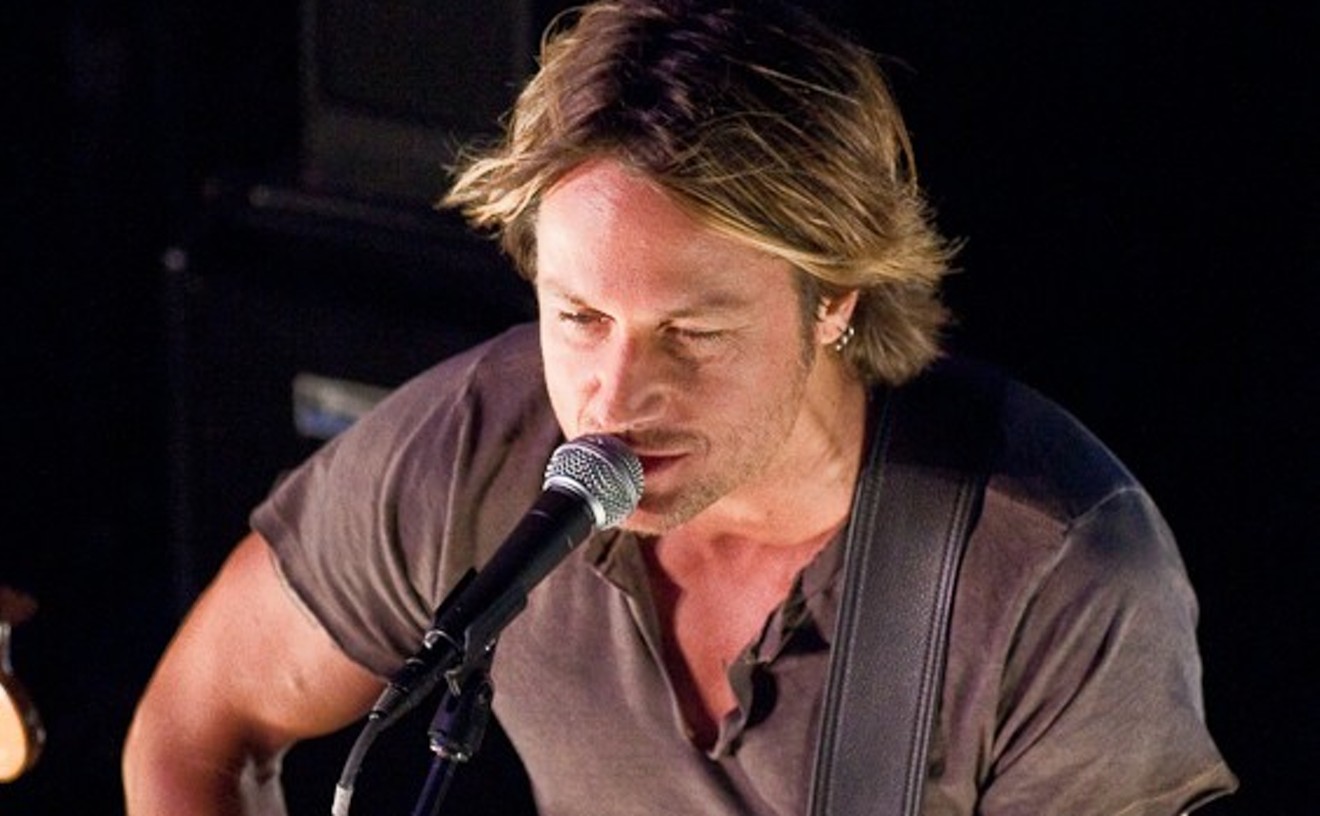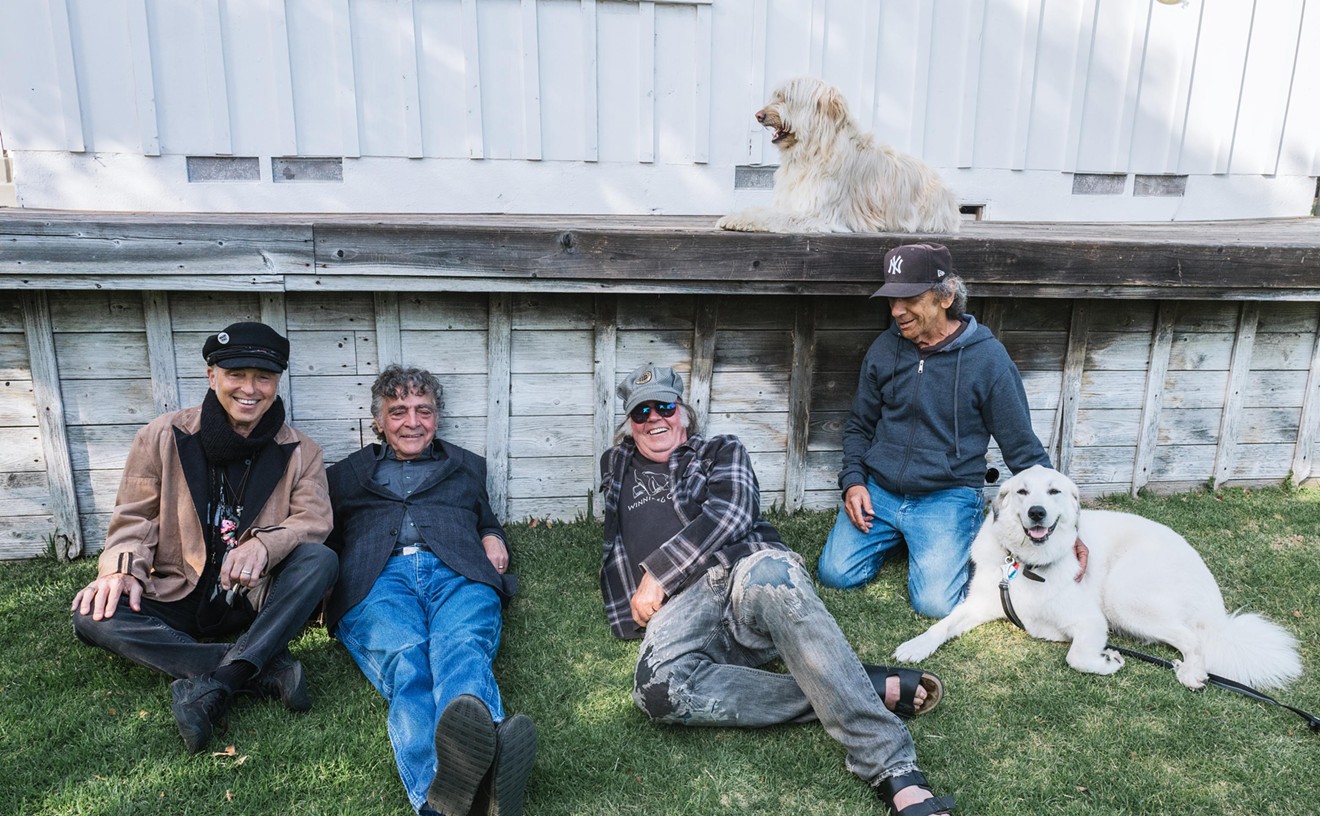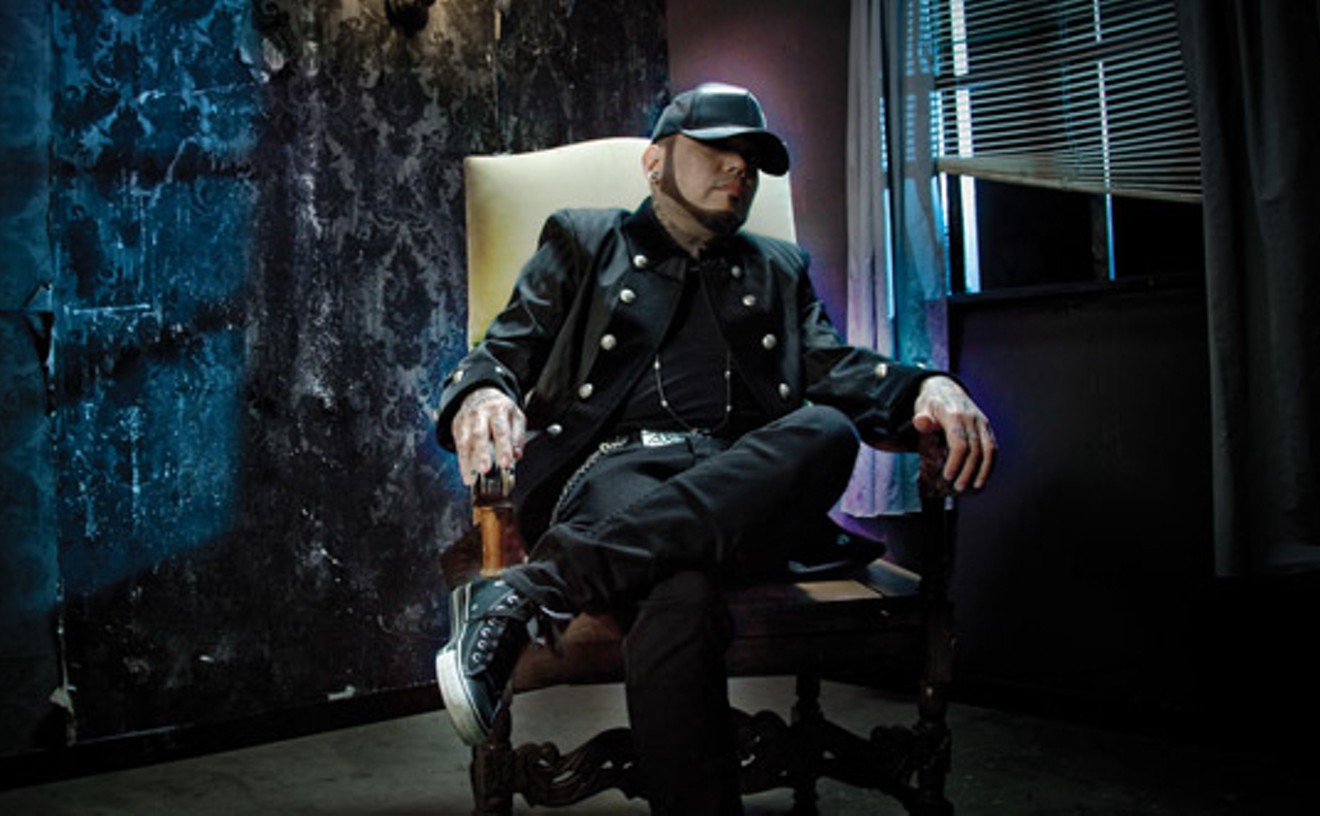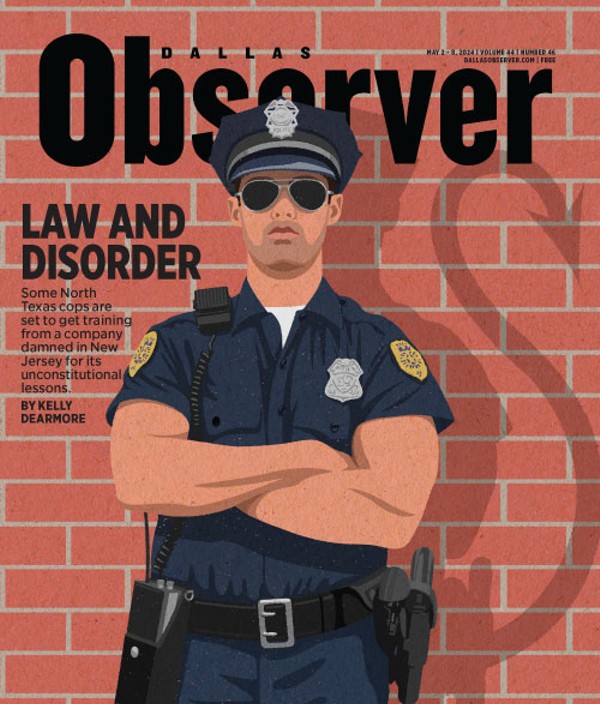No problem, Jane. Those of us who've followed her 14-year musical career--starting with the Windham Hill imprint Open Air Records in the early 80s, through four albums on Warner/Reprise and now onto the debut release, Teenager, on her own new label, Sheeba--would walk barefoot across a floor covered with scorpions for the chance to chat.
Luckily, no such test of faith is necessary: Siberry is on the phone when she said she would be, obviously exhausted and with what sounds like a slight cold, but unpretentiously poetic and fiercely intelligent--characteristics that have kept her music grounded through a series of mercurial stylistic flirtations. Her chameleon changes of sound never feel frivolous--she always keeps us wondering what she's going to do next, but we're utterly confident that no matter where her muse takes her, she'll deliver the musical goods.
"I don't make music to be flattered, or for noble artistic reasons," Siberry insists in her breathy, melodious voice. "Every song I write and record is because something has captured me. My fighting to get free of it is on the records. My songs are a power struggle: An idea has consumed me, and I resist it. That's the creative urge in everybody, the dialectic."
The dialectic between beauty and disintegration, love and anxiety pulses through the entire recorded canon of the 40-year-old Siberry. Starting with her first internationally distributed album, 1984's No Borders Here, Siberry proved herself a diarist of tiny moments writ with ambivalent--but blood-red--accuracy. (Her first collection of songs was released later. Siberry--who holds a bachelor's degree in microbiology--financed it through a full-time waitressing job.) In the electronic drum-laden "I Muse Aloud," she pledged her undying faith despite evidence of faithlessness ("I fill my baby up with so much love/He falls in love with all the girls"); with "The Waitress," she documented her own fear that with waiting tables, the means would become the end ("I'd probably be famous now/If I wasn't such a good waitress").
With the albums that followed, Siberry would assert increasing control--she always wrote all her own tunes, but her role as producer, keyboardist, and acoustic and electric guitarist took the fore. So did her restless imagination, which transformed tight little synth-pop ditties into 10- and 20-minute suites of yearning and lamentation.
There are minor miracles in the music of Jane Siberry. The first is that these operatic forays rarely sound self-indulgent, thanks to the triple threat of her amazing voice, which marries the hopeful whispers of a precocious child with the torchy wail of a woman screwed-over; her lyrical descriptions, which employ self-conscious romantic fantasy, self-deprecating humor, and a scientist's eye for physical detail; and most important of all, her apparently bottomless well of intricate, maddeningly memorable melodies. Her 1988 masterpiece The Walking, now unfortunately out of print, showcased a variety of extended meditations on searching using an evocative guitar-keyboard-layered vocal recipe that treated each piece like its own symphonic movement.
"Some songs are assembled from pieces of different songs," she says of her complex structures, "and others are recorded straight through in one take. I cut a nine-minute song called 'The Vigil' (from 1993's When I Was a Boy), then turned around and, to my surprise, my computer had been on the whole time. I was able to sequence the original demo, insert the sounds and voices I wanted right there."
The second miracle of Siberry's music is that she was able to convince a mammoth international label like Warner/Reprise to finance her elaborate musical visions on her own terms. It's not like her songs are difficult and uncommercial, manna for cultists--listen just once to "Love Is Everything" from When I Was a Boy or the jaunty, folksy title track from 1990's Bound By the Beauty, and chances are you'll be humming them to yourself for days. It's just that they're so damned eccentric, such an intimate collage of memorable harmonies, choruses, bridges, and instrumental interludes, all shaped in styles from tight, acoustic honky tonk-ish swing (Bound By the Beauty) to meandering cocktail-lounge jazz (1995's Maria).
When told that her melodies are more maddeningly diverse than those of most other contemporary artists, she demurs. "There's a definite shape to the music that I love, and there's a shape to music that makes me physically ill," she claims. "The key is to take the music and trace an outline of yourself with it. Of course, we all have many shapes, and that's what I've tried to trace with my songs--all my different moods."
Warner/Reprise was indulgent of Siberry's different moods up until the release of Maria. Like previous collections, the album contained a mixture of catchy, disciplined tunes (the bashful but teasing "Honey Bee," the big-band strut of "Loving Cup") and a series of free-form riffs with tinkling piano accompaniment and insinuating horn charts. Even a Siberry acolyte must admit that the album's 20-minute finale, "Oh My, My," is a bit of an endurance test. Into a shimmering ether of synths she improvises between the melodies of "Mary Had a Little Lamb" and "Puff The Magic Dragon." Oh my, my, indeed. Warner/Reprise wanted to bring in an outside producer for her next project; Siberry called their bluff.
"I've worked with other producers before, like Brian Eno," Siberry says. "But it all comes down to whether they'll let you be honest, say what you want to say. Nobody learns anything if you can't share your vision of the world.
"I had recorded four albums out of a contract for eight. Warner Brothers was no longer right for me. I wasn't selling records, so I was draining them financially; they were draining me of energy. I pulled out, and went into a long process of 'renegotiation,' which is what artists say when they have to camp out in the offices in protest to get their way."
Siberry's Toronto-based label Sheeba was born on May 17, 1996, in the midst of disentangling herself from her major-label commitment and studying the business possibilities of the Internet. She began Sheeba as a direct-mail distributor of her own recordings (the homepage address is www.SHEEBA.ca, the e-mail address, [email protected]), AND HAS SINCE BRANCHED INTO AN INTERNATIONAL PROMOTIONS SERVICE WITH 12 EMPLOYEES TO PROMULGATE "ALL THINGS SIBERRY." SIBERRY IS BALDLY HONEST ABOUT HER CAREER LEAP INTO CREATIVE INDEPENDENCE.
"I TOOK OUT A SMALL LOAN TO CREATE SHEEBA, WHICH I'M STILL PAYING OFF. I'VE OVEREXTENDED MYSELF FINANCIALLY. IT'S BEEN HARD ON ALL OF US. I'M ANXIOUS TO KEEP THE SHEEBA PHONE LINES RINGING. THE UPSIDE IS, I'VE GAINED AN INCREDIBLE AMOUNT OF WISDOM IN THE LAST YEAR, ABOUT MYSELF AND THE MUSIC BUSINESS. I'VE GAINED A NEW RESPECT FOR MONEY, AND THE ENERGY, THE POTENTIAL IT REPRESENTS."
THE VICTORIES HAVE INCLUDED A SETTLEMENT WITH WARNER/REPRISE THAT WILL ALLOW SIBERRY TO RELEASE HER NEXT TRIO OF ALBUMS, DRAWN FROM THREE DIFFERENT CONCERTS AT NEW YORK CITY'S LEGENDARY BOTTOM LINE WITH THREE DIFFERENT BANDS. SIBERRY CAN RE-RELEASE LIVE VERSIONS OF THE ORIGINAL MATERIAL SHE RECORDED FOR WARNER BROS. OF THAT ASSOCIATION, SHE SAYS PLAINLYo "I was glad to sign with Reprise, and now I'm glad to be away from them."
She cites Nashville, the city in which she's just landed and is set to perform that night, as an example of the trap she's just escaped. "This place is full of songwriters who don't write their personal view of the universe, they write what they think you want to hear. Where's the value? There's no exchange of ideas in that." The biggest sacrifice that jumping the major-label ship may entail is the current North American tour that's led her--for the first time in some 10 years--to play live shows in not only New York and Los Angeles, but smaller cities with a more uncertain fan base.
"I love performing live," she insists. "It's the touring I don't like, all the time that travel eats up. I always feel like there's so many other things I could be doing. And I'm still not well known in most of America's smaller cities, because I just don't get any radio play. It hasn't been prudent for me to tour a lot. But I'm traveling now to support the future of Sheeba."
Siberry admits to a more particular paranoia about multiple live shows across the continent. "Sometimes repetition is good, but there's also a danger in it. During concerts, I worry that I make the same small talk between songs in each city. There's something so false about that kind of canned talk; I can't stand it."
Teenager, the eighth Siberry recording, which she is now touring to support, is a brave, naked expression of her newborn hopes. These 13 supple, unadorned songs were recorded after Siberry had finished mixing her live New York City concerts, but seemed an especially appropriate debut for the Sheeba label. The stripped-down acoustic approach, she admits, "made it inexpensive to record." All the songs were written by her between the ages of 16 and 20, but they belie the sentimentality and excess one might expect from an adolescent who started off recording her own harmonies with two different tape recorders. Compared with some of the more frivolous entries on When I Was a Boy and Maria, they're confident and mature, even when addressing the most childish of pursuits. "Bessie" is a beautiful ode about a young Siberry trying to teach her favorite cow how to fly, but predictably, she doesn't neglect the potentially negative consequences ("I won't tell the Air Force/About my scheme/I know they'd just use you/For their flying machines"). Lovely, reflective tunes like "Puppet City" and "Viking Heart" offer thrillingly adult looks at, respectively, emotional paralysis and the enticements of a handsome, attentive stranger. She admits that some are directed to family and friends and some are purely fictional creations designed "to make a point." It's all in keeping with Siberry's careful tightrope walk between inviting her audience into her life, but not using them.
"There's a certain kind of folk music I hate," she says, but is diplomatic enough not to name names. "When artists make the music an exorcism, they turn the audience into a dumping ground. They don't entertain, they unload. You have to make it personal, but at the same time you have to keep it universal enough to serve on what I call 'the common table.' Everyone should be able to partake of it. When I was a teenager, my voice teacher told me, 'When the singer starts to cry, the audience stops crying.'"
Jane Siberry performs September 25 at Caravan of Dreams in Fort Worth. Eliza Gilkyson opens. Call (817) 429-4000.










